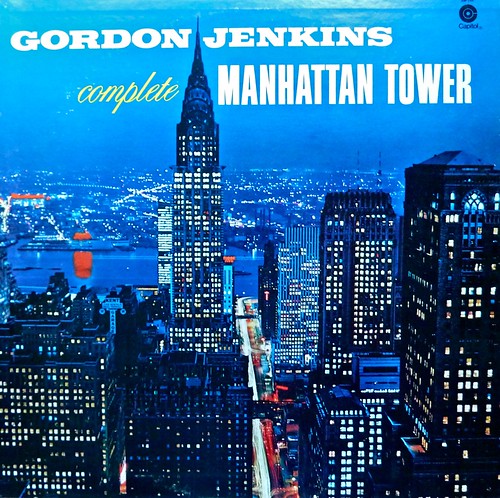
This record might be the polar opposite of a Weiner sext. It's very grand and striving, with lush orchestration, florid singing, and spoken narration. It acts like it's telling a momentous love story, a story that could only happen in New York City, a story on the scale of the Manhattan skyscrapers, but there's nothing important at all about Steve and Julie, who meet in a bar, go to a few New York places, and then separate. This was very hard to sit through, and I have a hard time believing my father found it too amusing.

You can listen the whole thing at YouTube, broken up into 4 parts: 1, 2, 3, 4. I mean, I don't know if you can, but the music is there to be listened to. I am not recommending it, except to experience the weirdness of overdone banality. Jenkins was not a nobody:
[H]e regularly arranged for and conducted the orchestra for various Decca artists, including Dick Haymes ("Little White Lies", 1947), Ella Fitzgerald ("Happy Talk", 1949, "Black Coffee", 1949, "Baby", 1954), Billie Holiday ("Crazy He Calls Me", "You're My Thrill", "Please Tell Me Now", "Somebody's On My Mind", 1949, and conducted and produced her last Decca session with "God Bless the Child", "This Is Heaven to Me", 1950), Patty Andrews of the Andrews Sisters ("I Can Dream, Can't I", 1949) and Louis Armstrong ("Blueberry Hill", 1949 and "When It's Sleepy Time Down South", 1951).He sounds sentimental, but how square could he be? Was it his job to impose some squareness on these artists? Later, he worked with Frank Sinatra:
The liner notes to Verve Records' 2001 reissue of one of Jenkins' albums with Armstrong, Satchmo In Style, quote Decca's onetime A & R Director, Milt Gabler, saying that Jenkins "stood up on his little podium so that all the performers could see him conduct. But before he gave a downbeat, Gordon made a speech about how much he loved Louis and how this was the greatest moment in his life. And then he cried."
[A]s rock and roll gained ascendancy in the 1960s, Jenkins' lush string arrangements fell out of favour and he worked only sporadically, though Sinatra, who had left Capitol to start his own label, Reprise Records, continued to call upon the arranger's services at various intervals over the next two decades, on albums such as All Alone (1962), the critically acclaimed September of My Years (1965), for which Jenkins won a Grammy, Sinatra's 1973 comeback album, Ol' Blue Eyes Is Back and She Shot Me Down (1981) - regarded by many "Sinatraphiles" as the singer's last great work.... Jenkins also composed the "Future" suite for Sinatra's 1980 concept album Trilogy: Past Present Future.My parents loved Frank Sinatra. (As I've said before, my father looked just like Frank Sinatra in the 1950s, when Frank Sinatra was at his most handsome. Later, Frank Sinatra got a little puffy and bald, and — I know it's only me saying this — my father aged better, never losing his thick, wavy, black hair, though he did, late in life, go blind in one of his blue eyes.) Here's Sinatra doing "September of My Years," with the lush orchestration of Gordon Jenkins. I should have listened to some of this more accessible music before subjecting myself to "Manhattan Tower." Perhaps that's what happened to my father: He developed an attachment to the music as it backed up Sinatra (or some of those other great singers) and he read about "Manhattan Tower" as some sort of peak of the art of Gordon Jenkins.
But "Manhattan Tower" comes across as very musical theater. It's intended to sound modern... to people living in the 1940s, when it was originally written. It lacks any jazz inflection, though there's one song about the mambo, a dance that Julie sings about not being able to do — after Stephen sings of an inability to waltz — because she never knows when to do the "uh." Which I think is sexual innuendo (of the most deniable kind). This is really too wholesome. Maybe there's some ironic way to listen to this, but I'm never going to be the one who tries to do it.
(I'm inviting comments — which must go through moderation — for the posts in this series.)
No comments:
Post a Comment